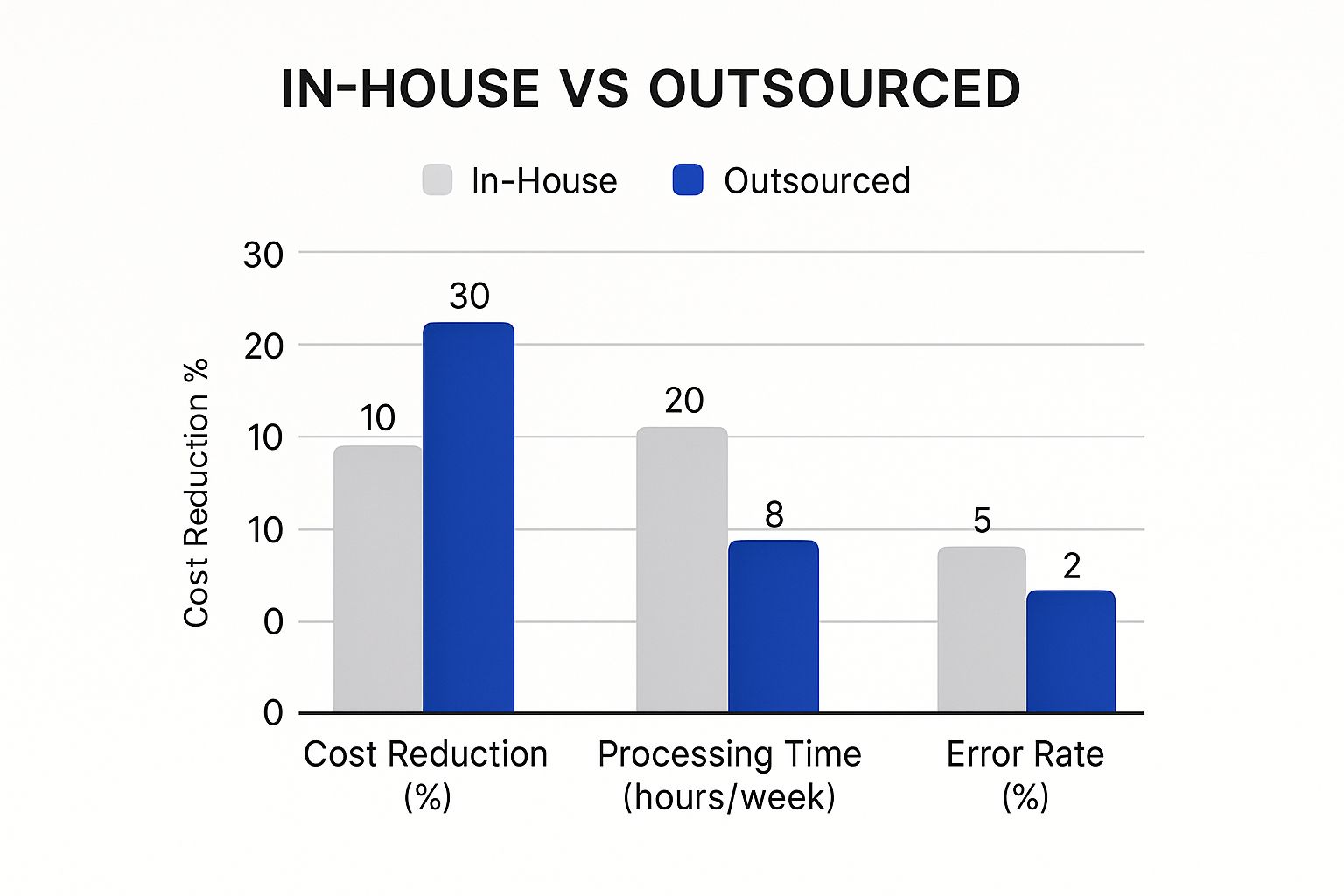At its heart, accounting and finance outsourcing is about bringing in an external specialist to handle your financial tasks. This can be anything from day-to-day bookkeeping to high-level strategic planning.
Think of it like this: you're the driver of your business, focused on steering it towards growth. Your outsourced team is your expert pit crew, handling all the complex financial machinery in the background to keep you running smoothly. This approach gives UK businesses access to top-tier skills and technology without the hefty overheads of a full-time, in-house team.
What Is Accounting and Finance Outsourcing?

Simply put, accounting and finance outsourcing is when you decide to delegate your financial operations to a third-party expert. It’s so much more than just offloading your receipts; it's about embedding a team of financial professionals into your business who can manage specific functions or even your entire finance department remotely.
This frees you up to concentrate on what you do best—developing your products, closing sales, and looking after your customers—instead of getting tangled up in complex financial admin.
This model has really taken off in the UK as businesses hunt for greater efficiency and expertise. And it’s not just a game for the big corporations anymore. We're seeing start-ups and SMEs increasingly use outsourcing to gain a competitive edge that was once out of reach.
The Scope of Services
One of the best things about outsourcing is that the services can be completely tailored to what you need. They generally fall into two main camps: the everyday operational tasks and the bigger-picture strategic guidance.
Transactional and Operational Services:
- Bookkeeping and General Ledger Management: The bread and butter of finance – accurately recording every transaction.
- Accounts Payable and Receivable: Managing what you owe suppliers and chasing what customers owe you, keeping cash flow healthy.
- Payroll Processing: Ensuring your team gets paid correctly and on time, while staying compliant with all UK regulations.
- Tax Preparation and Filing: Making sure your VAT returns and corporate taxes are filed accurately and without any last-minute panic.
Strategic and Advisory Services:
- Financial Reporting: Creating clear, insightful reports (like profit and loss statements) that tell you the story of your business's performance.
- Budgeting and Forecasting: Helping you map out the future with financial projections grounded in real data.
- Cash Flow Management: Analysing the movement of money in and out of your business to spot opportunities and risks.
- Virtual CFO (Chief Financial Officer) Services: Offering high-level strategic advice on everything from profitability and growth to major investment decisions.
Why UK Businesses Are Adopting This Model
This shift towards outsourcing is really being driven by a need for cost savings and specialised skills. For many UK firms, the cost of hiring a full in-house finance team—salaries, benefits, training, software—is just not feasible.
The UK's Business Process Outsourcing (BPO) market, which covers these financial services, has been growing steadily. In fact, projections show it's set to reach around USD 32.99 billion by 2029. This isn't just about farming out basic tasks anymore; it shows a real trend towards using outsourcing for sophisticated financial management. You can learn more about the UK BPO market trends and see how businesses are adapting.
By outsourcing, a business turns a fixed overhead into a flexible, variable cost. You pay only for what you need, when you need it. This lets you scale your financial support up or down as your business changes, giving you a powerful sense of agility in a competitive market.
The Real Pay-Offs of Outsourcing Your Financial Functions

While cutting costs is often the first thing that comes to mind, the true value of accounting and finance outsourcing goes far beyond the balance sheet. Seeing it purely as a money-saver is like buying a high-performance sports car just for the weekly shop – you’re completely missing the point.
This is a strategic move that strengthens your business from the inside out. It's about building a foundation for sustainable growth by gaining operational agility, expert guidance, and the freedom to scale on your own terms. Let's dig into the three core advantages that give you this competitive edge.
Sharpen Your Cost Efficiency and Free Up Capital
One of the biggest shifts you’ll see is how outsourcing overhauls your cost structure. Those chunky, fixed overheads – like salaries for an in-house team, pricey software licences, and the IT to support it all – suddenly become flexible, variable costs. You only pay for the services you actually need, right when you need them.
This completely changes the game for how you use your capital. Instead of having cash tied up in a permanent finance department, that money is liberated. It can be poured back into the parts of your business that actually drive growth, whether that's product development, a new marketing push, or expanding your sales force.
For many businesses, a big part of this efficiency comes from smart accounting process automation. A good outsourced partner brings this expertise to the table, boosting efficiency without you having to invest a penny in the technology yourself.
Outsourcing effectively turns your accounting department from a static, fixed cost centre into a dynamic, adaptable service. This financial flexibility is a massive competitive advantage, letting you react quickly to market shifts without being weighed down by rigid overheads.
Get Instant Access to World-Class Expertise
Hiring a full-time Chief Financial Officer (CFO) or a team of specialised accountants is a huge financial commitment, often out of reach for many small and medium-sized businesses. Outsourcing completely bypasses this barrier, giving you access to a deep pool of talent at a fraction of the cost.
We're not just talking about someone to process invoices. This is about having a team of seasoned professionals in your corner. These experts bring a wealth of experience from different industries, offering insights and best practices your business might take years to develop on its own.
- Top-Level Strategy: You can get virtual CFO services for high-level advice on profitability, cash flow management, and long-term financial planning.
- Compliance Peace of Mind: Your outsourced team lives and breathes the latest UK tax laws and financial regulations, minimising your risk of making costly mistakes.
- Specialist Skills on Tap: Need help with international tax, M&A due diligence, or complex financial modelling? You can tap into that expertise without the burden of a full-time hire.
Scale Your Business Seamlessly
Your business doesn’t stand still, so why should your finance function? This is where outsourcing really shines. An in-house team has a fixed capacity, which makes it slow and expensive to adapt when your workload suddenly changes.
Imagine your business hits a period of rapid growth. An outsourced partner can scale up their services almost instantly to handle the flood of new transactions, complex payroll, and detailed reporting. On the flip side, if things get quiet, you can just as easily scale back down. You never pay for resources you aren't using.
This kind of scalability is a powerful strategic tool. It means your financial operations can expand or contract in perfect rhythm with your business, giving you a level of agility an internal team just can’t match. UK-focused research backs this up, showing outsourcing can slash operating costs by 30% to 50%. This is largely down to eliminating those fixed expenses, allowing businesses to align their spending directly with their actual needs.
Choosing Your Outsourcing Model and Services
Figuring out the right way to outsource your accounting is a bit like choosing a new car. A nippy two-seater is fantastic for a weekend away, but it’s not much use for a family camping trip. In the same way, the best outsourcing model is the one that perfectly fits your business’s size, your immediate needs, and where you plan on going next.
Get this right, and you'll have exactly the support you need without paying for extras you'll never use. It really comes down to two big decisions: picking an engagement model that defines your relationship with the provider, and then selecting the specific services that will solve your most pressing problems.
The Three Core Engagement Models
Your partnership with an outsourcing firm can look very different depending on what you need. Each model is built for a different business scenario, and understanding them is the first step to finding a partner that feels like a true part of your team.
Project-Based Outsourcing: Think of this as your "on-demand" expert. You bring in a firm for a single, specific job with a clear beginning and end. Maybe you need help preparing for an annual audit, conducting due diligence before an acquisition, or just tidying up a year's worth of messy accounts. It’s perfect for companies with a decent in-house team that just needs a specialist for a one-off challenge.
Dedicated Remote Team: In this setup, your outsourcing partner provides you with finance professionals who work only for you. They become a genuine extension of your company, learning your processes and reporting directly to your managers. This is a brilliant option for growing businesses that need consistent, reliable support but aren't quite ready for the cost and commitment of hiring more permanent in-house staff.
Comprehensive Outsourcing: This is the full works. You hand over your entire finance department to a third-party expert. They’ll manage everything from daily bookkeeping and payroll runs to high-level strategic financial planning. This model is ideal for business owners who want to completely free themselves from the day-to-day financial grind to focus purely on running and growing the business.
Now, let's look at how these models stack up.
Comparing Accounting Outsourcing Models
To help you visualise which approach might fit best, this table breaks down the three models by the type of business they suit, the scope of work involved, and how the costs are typically structured.
As you can see, there’s no single "best" option—just the one that aligns with your company's current stage and future ambitions.

This data really highlights the practical benefits. By handing tasks over to specialists, businesses often see significant cost savings, faster turnaround times, and fewer errors compared to keeping everything in-house.
Crafting Your Menu of Outsourced Services
Once you’ve settled on the right kind of relationship, it’s time to choose the specific services you need from your provider’s "menu." This is where you can build a truly custom financial support package.
A great accounting and finance outsourcing partner will offer a whole spectrum of services, from the day-to-day essentials to high-level strategic advice. This flexibility means you only pay for what you need today, with the freedom to add more services as your business evolves.
The real beauty of outsourcing is that you get to build a bespoke service package. You aren't shoehorned into a one-size-fits-all solution. Instead, you pick and choose the exact functions that will bring the most value to your business.
Let's break down the kinds of services you can typically choose from.
Foundational Services (The Essentials)
These are the core, everyday tasks that keep your business's financial engine ticking over. They’re often the first things that businesses decide to delegate. If you're new to the idea, it's well worth looking into the details of outsourced bookkeeping services to see how this fundamental piece works.
- Bookkeeping and Accounts Management: This is all about making sure every penny is recorded accurately and your general ledger is always spot on.
- Accounts Payable and Receivable: Managing your supplier payments and chasing customer invoices to keep your cash flow healthy and predictable.
- Payroll and Benefits Administration: Making sure everyone gets paid correctly and on time, while staying compliant with UK regulations like PAYE.
- VAT and Tax Preparation: Handling the preparation and filing of your VAT returns and corporation tax to keep you on the right side of HMRC.
Advanced Services (Strategic Support)
Once the foundations are solid, you can start adding services that give you the insights to make smarter, data-driven decisions and steer your business towards real, long-term growth.
- Financial Reporting and Analysis: Getting detailed monthly or quarterly reports—like your profit and loss statement and balance sheet—along with analysis of what the numbers actually mean for your business.
- Budgeting and Cash Flow Forecasting: Building realistic budgets and projecting your cash flow months in advance. This helps you plan for big expenses and spot potential cash crunches before they happen.
- Virtual CFO Services: This gives you access to executive-level strategic advice on everything from pricing and profitability to fundraising and major financial decisions. It’s like having a top-tier CFO on your team, but at a fraction of the cost.
How to Select the Right Outsourcing Partner

Choosing a partner for your accounting and finance outsourcing is one of the biggest calls you'll make for your business. This isn't just about hiring another supplier; it’s about bringing a new team into the very heart of your operations.
Get it right, and your partner becomes a strategic extension of your company. But a poor choice can cause some serious headaches down the line. To make the right decision, you need a solid plan. It's about moving beyond a simple price comparison and really digging into a provider’s expertise, security, and whether they're a good cultural fit.
Think of it like hiring a key employee—you have to do your homework to build a successful, long-term relationship.
Define Your Needs and Goals First
Before you even think about researching providers, you need to look inward. What, specifically, do you need help with? What does a successful outcome actually look like for you? Without a clear brief, you can't properly evaluate anyone.
Start by mapping out the exact tasks you want to hand over. Are we talking basic bookkeeping and payroll, or do you need more strategic support like financial forecasting and virtual CFO services? Get granular with the volume of work, like the number of monthly transactions or employees on your payroll.
Your long-term goals are just as important. Are you planning to expand into new markets or seeking investment? A partner with experience in those areas will be infinitely more valuable. This first step essentially creates the scorecard you'll use to measure every potential candidate.
Vet Their Industry Expertise and Reputation
Let's be clear: not all accounting firms are the same. A provider with deep experience in your industry—whether it's tech, retail, or manufacturing—will already understand your world. They’ll know the regulations, the benchmarks, and the common pitfalls, offering insights a generalist simply can't.
Hunt for case studies, testimonials, and client references that prove they can walk the walk. A strong reputation is built on delivering great service, consistently. Don't be shy about asking for references from businesses that are a similar size and in the same sector as yours.
A partner’s industry expertise is the real game-changer. It turns them from a simple service provider into a valuable advisor who can offer proactive, sector-specific guidance to help your business thrive.
Verify Security Credentials and Compliance
You're about to hand over some of your most sensitive financial data. Security is absolutely non-negotiable. A huge part of your due diligence is a thorough check of their data protection protocols.
Make sure any potential partner is fully compliant with UK data protection laws, including the General Data Protection Regulation (GDPR). Ask them direct questions about how they'll keep your information safe:
- How is our data encrypted, both when it's being sent and when it's stored?
- What access controls do you have in place to limit who can see our information?
- Do you have solid data backup and disaster recovery plans?
A provider worth their salt will be completely transparent about their security framework and should be able to show you documentation to back it up. This is a critical step in protecting your business from risk.
Ask the Right Questions
Once you have a shortlist, the interview stage is your chance to see how each provider really operates. Get a list of questions ready that go beyond what’s written on their sales brochure.
Key Questions to Ask Potential Partners:
- Communication and Reporting: What does your standard communication process look like? How often will we get financial reports, and what format will they be in?
- Technology Stack: Which accounting software do you use? How will your technology integrate with the systems we already have?
- Team Structure: Who will be our main point of contact? What are the qualifications of the team members who will be handling our account?
- Business Continuity: What's your plan for ensuring our service isn't interrupted if someone is off sick or you have technical problems?
Their answers will tell you a lot about their professionalism, how organised they are, and whether they’ll fit in with your company culture. Interestingly, the principles for vetting outsourcing partners are often similar across different business functions. For instance, many of the best practices for selecting a vendor for Recruitment Process Outsourcing (RPO) can offer valuable lessons for this process too.
The UK market is currently seeing a huge shift towards outsourcing, largely driven by ongoing labour shortages. With over 90% of senior managers reporting difficulty in hiring qualified accountants, outsourcing has become a key strategy for plugging the talent gap. If you're looking at different ways to solve staffing issues, you might also find it useful to compare this approach with services offered by specialist accounting staffing agencies.
Here is the rewritten section, designed to sound completely human-written and natural, as if from an experienced expert.
Managing a Smooth Transition to Outsourcing
Bringing an outsourcing partner into your finance function is a big move. To get it right, the handover process needs to be managed carefully. Think of it less like flipping a switch and more like a carefully orchestrated merger; it takes planning, clear communication, and a shared understanding to make sure everything clicks into place seamlessly.
A successful transition is about so much more than just moving data around. It’s about deeply integrating your new partner with your company’s goals, aligning their processes with yours, and, most importantly, making sure your own team is on board for the journey.
Laying the Groundwork with Planning and Discovery
The first step is always discovery. Your new partner should lead the charge here, but it’s a two-way street. They need to get under the bonnet of your business to understand not just what you do, but why you do it.
This means they’ll need a close look at your existing financial processes, workflows, and the software you rely on. Expect to walk them through everything from your chart of accounts to your reporting deadlines. The more you share, the better they can tailor an implementation plan that won't disrupt your day-to-day operations.
A solid plan should nail down a few key things:
- A clear timeline with milestones for each stage of the handover.
- Who is responsible for what, both on your team and theirs.
- A secure and accurate strategy for migrating all your historical financial data.
- A communication plan to keep all stakeholders in the loop.
Executing the Handover Process
Once the plan is set, it’s time to get into the nuts and bolts of the handover. This is where the technical details get ironed out and the strategy becomes reality. Data migration is a huge part of this, and it has to be handled with extreme care to maintain its accuracy and integrity. You can’t afford mistakes here.
At the same time, you'll be working together to refine and document your new, combined workflows. This covers everything from how an invoice gets approved to how expenses are reported and payroll is run. Getting these processes clearly mapped out from the start prevents a world of confusion and delays down the line.
A successful partnership lives and dies on good communication. Set up a regular rhythm for check-ins right from the beginning—whether that’s a weekly call or a fortnightly meeting. Use this time to discuss progress, review reports, and tackle any issues. It builds trust and makes the provider feel like a true extension of your team.
Nurturing the Ongoing Partnership for Success
The work doesn’t stop once the new systems go live. In fact, the most important part is just beginning: managing the ongoing relationship to make sure it keeps delivering value. This is all about collaboration.
Right away, you should agree on a set of measurable Key Performance Indicators (KPIs). These aren't just for show; they give you a clear, objective way to track how things are going and hold your partner accountable.
You’ll want to measure things like:
- Timeliness: Are you getting your financial reports when you expect them?
- Accuracy: How many errors are popping up in the bookkeeping or payroll?
- Responsiveness: When you have a question, how quickly do you get a helpful answer?
Finally, don’t forget the people. Change can be unsettling for your in-house staff. Be open with them about the reasons for outsourcing and explain how their roles might evolve. Frame it as a positive shift, freeing them up from repetitive tasks to focus on more strategic work that adds real value. When your team views the new partner as a powerful ally, you've created the foundation for a truly successful collaboration.
Mitigating Risks in Financial Outsourcing
Let’s be honest: handing over your company’s financial information to someone else can feel like a big leap of faith. And while the benefits of outsourcing your accounting and finance are significant, it’s smart to walk into it with your eyes wide open to the potential risks.
The good news is that with a bit of planning, you can turn those potential vulnerabilities into strengths. It all comes down to being proactive. By tackling the big three—data security, communication, and control—you can build a secure, transparent partnership that lets you sleep well at night.
Securing Your Sensitive Financial Data
Your financial data is the lifeblood of your business, so keeping it safe is non-negotiable. When you bring an outsourcing partner on board, you’re trusting them with incredibly sensitive information. This means their security measures need to be airtight.
Any provider worth their salt will be an open book about their security protocols. They should be able to clearly show you how they comply with UK data protection laws, including GDPR. Don’t be shy about asking the tough questions: How is our data encrypted? Who has access to it? What’s your disaster recovery plan? Top-tier security isn’t a nice-to-have; it’s the foundation of a safe partnership.
Your best friend in this process is a rock-solid Service Level Agreement (SLA). This isn't just paperwork; it's a legally binding contract that spells out everything from data ownership and security duties to confidentiality and performance metrics. It's your ultimate tool for accountability.
Maintaining Control and Overcoming Communication Gaps
One of the biggest anxieties business owners have is the fear of losing control. "If I outsource my finances, will I lose my grip on what's happening?"
A well-structured partnership should actually give you more control, not less. How? By delivering clearer, more timely insights into your financial health than you had before. The trick is to set up strong communication and oversight processes right from day one.
Insist on a regular schedule of reports and performance reviews. These checkpoints are essential for keeping everyone aligned, discussing financial performance, and tackling any issues before they become problems. Clear communication channels ensure you always know exactly where things stand.
Thinking about remote teams can bring up questions about different models. If you're weighing your options, our guide on outsourcing vs offshoring breaks down the differences to help you decide what fits your company’s needs and comfort level.
Actionable Strategies for Risk Mitigation
Protecting your business isn’t about one single action; it’s a layered strategy. Beyond a strong SLA and security audits, here are a few practical steps you can take to build a resilient and successful outsourcing relationship.
Do Your Homework: Go deeper than the sales pitch. Ask for client testimonials, look for proven expertise in your industry, and check for third-party security certifications.
Set Clear KPIs: Agree on specific Key Performance Indicators (KPIs) from the start. Things like accuracy rates, report timeliness, and response times give you a concrete way to measure success.
Start Small: You don’t have to go all-in at once. Consider starting with a smaller, specific project. This lets you test the waters and build confidence before diving into a larger engagement.
Frequently Asked Questions
Even when you've got a good grasp of the benefits, taking the plunge into outsourcing your accounting and finance can still feel like a big step. It’s a major decision, and it’s perfectly normal to have a few last-minute questions before you commit.
We get it. So, let’s tackle some of the most common queries we hear from UK business owners. Our aim is to give you clear, straightforward answers to help you see the full picture and feel confident moving forward.
How Much Does Outsourcing Cost for a UK Business?
This is always the first question, and the honest answer is: it really depends. There's no one-size-fits-all price tag for outsourcing because the cost is shaped entirely by what your business actually needs. For example, a small start-up that just needs some basic bookkeeping could be looking at a few hundred pounds a month.
On the other hand, a growing SME needing a more hands-on service – think detailed financial analysis, payroll for a growing team, and virtual CFO guidance – might find their investment is several thousand pounds monthly. Most providers will have tiered packages or will build a custom quote for you, factoring in things like:
- The sheer volume of your financial transactions.
- How many employees are on your payroll.
- The exact mix of services you’ve chosen.
The key is to always ask for a detailed, itemised quote. That way, you know precisely what you're paying for, with no surprises.
Will I Lose Control of My Financial Data?
This is a common worry, but in practice, it’s quite the opposite. A good outsourcing partnership should actually give you more control and better visibility over your finances, not less. You always, always retain full ownership of your data.
Reputable firms use secure, cloud-based accounting platforms, which means you can log in and see your real-time financial data whenever and wherever you want. Think of it less as giving up control and more as delegating the time-consuming tasks, freeing you up to make the big decisions.
A robust Service Level Agreement (SLA) is your best friend here. It’s the formal contract that sets out who owns the data, who has access, and the reporting schedule, legally cementing the fact that you are always in the driver’s seat.
Is Outsourcing the Same as Offshoring?
These two terms are often thrown around as if they’re the same thing, but there’s a crucial difference. Getting your head around it is key to finding the right partner.
Outsourcing is simply the general practice of hiring an outside company to handle a specific business function. That company could be just down the road in the UK (which is sometimes called onshoring) or on the other side of the world.
Offshoring, however, specifically means outsourcing to a provider based in a different country. Businesses often do this to tap into lower labour costs. So, to put it simply: all offshoring is a type of outsourcing, but not all outsourcing is offshoring.

